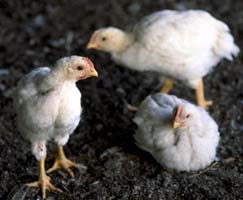State Readies to Lift Fowl
Flu Restrictions

|
| Farmers will be able to move poultry and
sell live birds for the first time since February. (Photo
by Joe Valbuena, courtesy USDA) |
By Zenitha Prince
Capital News Service
Friday, April 2, 2004
ANNAPOLIS - Avian flu restrictions will be
lifted within days if no new cases are found, Maryland Department of
Agriculture said Friday.
By Monday, farmers could have leeway to move poultry and litter and
gather and sell live birds for the first time since the flu's February
appearance in two Delaware flocks.
"Cautious optimism" is what farmers feel right now, said Joe Chisholm,
farmer and president of Delmarva Poultry Industry Inc. "Hopefully we'll get
back to generating cash."
Lifting the quarantine will also allow officials to pursue plans to
prevent future outbreaks in the state's multimillion-dollar industry and
address other biosecurity concerns.
"Clearly the last 60 days has taught us a great deal about real-time
practice of emergency measures," said Deputy Secretary John Brooks.
Brooks praised the "cooperative spirit" of Maryland, Delaware and federal
officials, as well as Delmarva poultry producers.
"This has been a difficult time and a real wake-up call for all of us
involved with poultry and agricultural businesses and hobbies across the
state," said Secretary Lewis Riley in a prepared statement. "We thank
everyone for their quick response, cooperation and vigilance in containing
this avian influenza incident."
Chisholm also lauded the "unprecedented cooperation" among stakeholders,
but said farmers fear a return of the economically devastating disease.
The H7N2 strain of the virus was first discovered on farms in Delaware's
Kent and Sussex counties, and appeared a month later on a Maryland farm in
Worcester County, some 60 miles away.
Maryland officials were mystified by the flu's reappearance after weeks
of testing, restricted farm movement, disinfection procedures and other
measures.
Though Monday will mark 30 influenza-free days on the 252 tested farms
within six miles of the infected site, officials warn growers to be careful.
"We should not let down our guard," Riley said. "We all need to keep a
sharp lookout for illness in our flocks, call in any unusual signs, and
practice good biosecurity measures."
Now that the crisis seems contained, officials are looking toward
preventing future outbreaks.
A "postmortem" will be conducted to establish a regional response to
avian flu and other animal health issues. In addition, farmers will be
trained in biosecurity practices and regulations will be drafted to protect
the industry.
Several other countries banned U.S. poultry products after the flu
outbreaks and the federal government is working to reestablish the
industry's reputation.
Gov. Robert Ehrlich recently directed the Agriculture Department and the
Department of Business and Economic Development to assess the economic
impact of the outbreak on agriculture, which has a $17.6 billion impact on
the state's economy.
"Certainly, it will take some time to recoup economic losses," said
Brooks, but "I look forward to working together on actions that will further
protect agriculture."
Copyright ©
2004 University of Maryland Philip Merrill College of
Journalism
